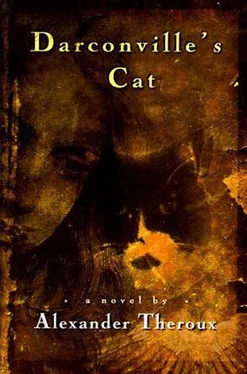It had long seemed clear, commandmental: to seek out a relatively distant and unembellished part of the world where, in the solitude he arranged for himself — rather like the pilgrim who lives on lentils, pulses, and the tested modes of self-denial — one might apply himself to those deeper mysteries where nameless somethings in their causes slept. He sought the obol of Pasetes, the mallet of Daikoku, the lamp of Aladdin. There were difficulties, often, in the way of carrying out his plans. But he overbore them and, hoping to fall prey to neither fascination nor fatigue, sought only to stem distraction, to learn the secrets beyond the world he felt belonged to him, and to write. It was the Beatitude of Destitution.
Alaric Darconville — insurrect, courteous, liturgical — was twenty-nine years old. He had the pointed medieval face of a pageboy, which showed less of mature steadiness than innocent deliberation, an expensive coloring backlit with a kind of intangible grace, and his eyes, of a strange tragic beauty, dark and filled with studying what’s represented by what is, could light up like a monk at jubilee when rounding the verge of a new idea and sparkle up in happy conviction as if to say “Excelsior!” He dreamed, like Astrophel, with his head in the stars. His mind was like one of those Gothic cathedrals of which he was so fond, mysterious within, and filled with light, a brightness at once richer and less real than the light of day, flashing accompaniment, on occasion, to the long satirical tirades of which he was also capable and yet wakefully aware, in gentleness, of what in matters of difficulty he felt should either be removed, pitied, or understood. He was six feet tall. His hair he wore long, like the Renaissance prince at his lyre, and it matched in color his coat of jet which was of an obsolete but distinct cut and as black as the mundus where Romans communed with their dead.
The book he was working on — a grimoire, in the old style— recapitulated such communication. He scribbled away in the light of his gooseneck lamp that not only left the rest of the room in darkness but at such times rendered insignificant any matters of consequence beyond that. There was a private quality about him as he worked: a wizard in conical hat conjuring mastertricks; the sacristan jing-jing-jingling the bells of sext; the alchemist, counsel to caliphs, shuttling in a cellar enigmatic beaker to tort for rare demulcents and rubefacients. It was a closed world, his, arresting thoughts for words to work, to skid around, to transubstantiate: the writer is the ponce who introduces Can to Ought. He crafted his writing and loved listening to those tiny explosions when the active brutality of verbs in revolution raced into sweet established nouns to send marching across the page a newly commissioned army of words-on-maneuvers, all decorated in loops, frets, and arrowlike flourishes. Darconville was bedeviled by angels: they stalked and leaguered him by night and day, and, when sitting at his desk, he never failed to acknowledge Stimulator, the angel invoked in the exorcism of ink, for the storm and stress of making something from nothing partook no less of the supernatural than Creation itself. Was doubt the knot in faith’s muscle? And yet faith required to fill the desert places of an empty page? Then this was a day in September no different from any others on which he wrote, the mind making up madness, the hand its little prattboy hopping along after it to record what it could of measure — but there was one exception.
Darconville anxiously kept seeing the face of one of his students, someone he had noticed on the first day of class. She was a freshman. He didn’t know her name.
He might have spent an inattentive afternoon in consequence but, subdued by what had no charm for him, instead vexed himself to write as a means of serving notice to a mischief he’d been uncertain of now for too many days. Beauty, while it haunted him, also distracted him; unable to resist its appeal, he, however, longed to be above it. There is a will so strong as to recoil upon itself and fall into indecision: a deliberate person’s, often, who, otherwise prompt to action, sometimes leaves everything undone — or, better, assumes that whatever has been done is something already charged to an appointed end, relieving him then of calling into question by subsequent thought the meaning of its worth. Did Darconville’s mind, then, obsessed and overwhelmed by images and dreams of the supernatural, crave at last for the one thing stranger than all these — the experience of it in fact? It is perhaps easy to believe so.
He was born — of French and Italian parentage — on the reaches of coastal New England where the old Victorian house that was the family seat stands to this day in a small village hard by the sea. It was always a region of spectacular beauty, infinite skies and meadows and ocean, and all aspects of nature there seemed drawn together in a tie of inexpressible benediction. His youthful dreams were always of a supernatural cast, shot through with vision, and nothing whatsoever matter-of-fact could avail against the propagation of his early romantic ideals. It had been instilled in him early — his Venetian grandmother fairly threw her hands over her ears at the suggestion of any aspiration less noble — that the goal of a person’s life must naturally afford the light by which the rest of it should be read, a doctrine that paradoxically created in him less a strength against than a disposition to a belief in unreal worlds, a condition somehow making him particularly unsuited for the heartache of real life.
The facts of one’s childhood are always important when touching on a genius. Darconville was an ardently religious boy, much attracted to ritual. At six, he won the school ribbon for a drawing of the face of God — it resembled a cat’s — and illustrated a juvenile book of his own dramatic making which ended: “ But wait, there is something coming toward me —!” There were illnesses, and a double pneumonia in childhood following a nearly fatal bout with measles left his lungs imperfect. He would never forget his father who read to him or his mother who kissed him goodnight, for he lost both of them before he was fourteen, whereupon, becoming wayward and discontented with everything else, he cut short his schooling to join the Franciscan Order, less on the advice growing out of the newly assumed regency of his grandmother, though that, than on the investigation of a dream: a nostalgia for vision, if commonly absent in others, then not so for a little boy whose earliest memory was of trying to pick up pieces of moonlight that had fallen through the window onto his bed.
Seminary life in those early years led to strange and unaccountable antipathies. It was not that he didn’t feel he fit, but if particulars went well — in everything, save, perhaps, for the occasional youthful temptation he suffered during lectio divina while reading Lucretius on the terminology of physical love — general acceptance came hard. He improvised piano arrangements at midnight, claimed he could work curses, and put it about that he believed animals, because of a universal language from which we alone had fallen, could understand us when we spoke. He astonished his fellow students, furthermore, with several rapturous edificial schemes few shared: to rebuild the tomb of St. John at Ephesus; to set up birdhouses for Christ through upstate New York; and to reconstruct — he actually stepped off the dimensions on the ballfield and began to assemble planks — Noah’s Ark. Throughout these years he showed a splendid but innocent sense of fun.
Darconville owned a great fat pen he called “The Black Disaster” —an object, he demoted, no other hand dare touch! His classmates were solemnly, ceremoniously, assured it was magic, and it was coveted by all of them only in so far as stealing it might render its owner a less vivid, if not less bumptious, antagonist. He managed never to relinquish it, however, and drew angels all over his copybooks; wrote squibs about some of his colleagues which, signed “Aenigmaticus,” he secretly distributed in various library books; and one day, for drawing a fresco — his capolavoro —of St. Bernard excommunicating a multitude of flies at Foigny, where each little creature ingeniously, but undisguisedly, bore the face of one of the college prefects, he was slapped so hard by a certain Father Theophane that it effected a stammer in him that would be activated, during moments of confrontation, for the rest of his life. Hostility eventually built up, and his unconventional conduct became the subject of such unfavorable comment in the college that it was suggested he leave. A few defended him. (He believed it was because there had once been a cardinal in his family, as indeed there had been.) The rest, some silently abusive, naggingly malevolent, or outright vindictive, more or less concurred in the bizarre if hard to be seriously taken fiat that he not only vacate the premises but withdraw, meditate, and summarily impale himself on the same wretched object that had been the source, in several ways, less of any black disaster than of their own humorless and over-pious objections.
Читать дальше












